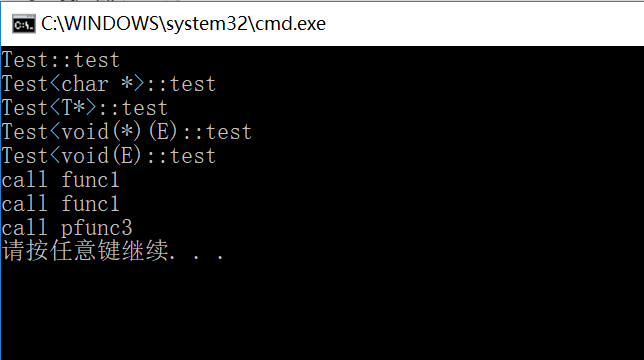有关类模板和函数模板的一些概念:
1、函数模板不支持模板参数给默认值(C99标准),类模板支持参数给默认值。
2、类模板有选择性实例化。
3、类中部分函数特例化时,一定要提供成员方法的模板。
4、成员方法的特例化不能在类外定义(语法不支持)。
5、类模板不能进行模板的实参推演,实参推演只针对函数模板。
6、出了编译器自动生成的成员函数之外,其他成员方法的模板完全可以代替普通的成员方法。
代码示例:
#include <iostream>
using namespace std;
//类模板
template<typename T>
class Test
{
public:
void test()
{
cout << "Test::test" << endl;
}
};
//完全特例化
template<>
class Test<char *>
{
public:
void test()
{
cout << "Test<char *>::test" << endl;
}
};
//提供针对指针的非完全特例化版本
template<typename T>
class Test<T*>
{
public:
void test()
{
cout << "Test<T*>::test" << endl;
}
};
//返回值void 带有一个类型为T类型的参数的函数指针 提供非完全特例化
template<typename E>
class Test<void(*)(E)>
{
public:
void test()
{
cout << "Test<void(*)(E)::test" << endl;
}
};
template<typename E>
class Test<void(E)>
{
public:
void test()
{
cout << "Test<void(E)::test" << endl;
}
};
void func1(int data)
{
cout << "call func1" << endl;
}
void func2(double data)
{
cout << "call func2" << endl;
}
void _cdecl pfunc3(int)
{
cout << "call pfunc3" << endl;
}
int main()
{
Test<int> t1;
t1.test();
Test<char *> t2;
t2.test();
Test<float *> t3;
t3.test();
Test<void(*)(int)> t4;
t4.test();
Test<void (int)> t5;
t5.test();
typedef void (*PFUNC)(int);//函数指针类型
PFUNC pfunc = &func1;
(*pfunc)(10);
typedef void (PFUNC2)(int);//函数类型
PFUNC2 *pfunc2 = &func1;
(*pfunc2)(20);
PFUNC2 pfunc3;
pfunc3(10);
return 0;
}
运行结果:
